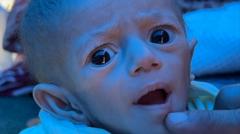In the heart of Gaza, the human cost of war is exemplified through the fragile life of Siwar Ashour, a five-month-old girl whose health hangs in the balance. In a local hospital, the emaciated infant's situation serves as a stark reminder of the broader humanitarian crisis unfolding in the region. Her weight, a concerning 2kg, far below the normal standards for her age, has distressed local healthcare workers and her family, compounding the tragic narrative of survival amid violence.
Despite being discharged from Nasser hospital, hopeful to improve with a can of special baby formula provided by doctors, Siwar's condition remains tenuous. Her mother, Najwa, describes her struggle: “We can't provide milk or diapers because of the prices and the border closure." With the Israeli blockade tightening access to essential supplies, many mothers find themselves unable to breastfeed due to malnutrition.
Najwa's living conditions are precarious—her home is a cramped one-bedroom shelter with minimal resources. Surrounding them, the sounds of war—a stark reminder of the suffering—affect Siwar deeply. "When she hears these sounds, she gets startled and cries," Najwa recounts, an echo of a life spent under constant threat.
International bodies have raised alarms about the food shortages affecting Gaza, yet the Israeli military insists otherwise. In a baffling statement, Israeli military body Cogat claimed that significant quantities of baby food have entered the region, contradicting the dire testimonies of families struggling to feed their children. Such claims diverge from the overwhelming evidence provided by aid agencies and humanitarian organizations that highlight the daily realities of starvation and deprivation.
As of now, 80% of Gaza is classified under heavy Israeli military zones, pushing civilians further into hardship, with supplies of fuel, water, and food dwindling to alarming levels. UN Secretary General Antonio Guterres described the situation as "the cruellest phase of this cruel conflict," emphasizing the limited aid trickling into the area.
Through the anguish, Najwa's resolve remains strong amidst uncertainty. "One does not think about the future or the past," she states. Each day is a fight for survival, not just for herself but for Siwar, who embodies the hope and despair of millions caught in this brutal conflict—a haunting symbol of innocence amid chaos.



















